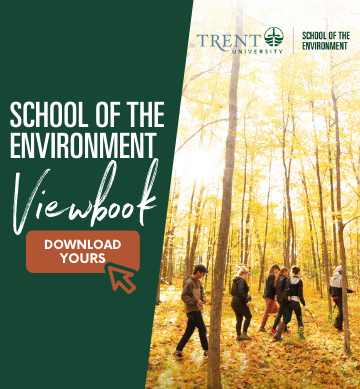Hands-On Experience
TSE Students have numerous opportunities to enroll in a variety of field courses in upper years of study. Some take place during the fall and winter terms, but most run during summer months (May - August) during a time when ecosystems are most active. Typically field course are intense experiences for a few weeks on a specific subject. Learn the practical aspects of agricultural systems; conduct shoreline assessments; take field trips to farms; work with community organizations on biomonitoring projects in lakes and forests.
Field courses may cost more than a standard course, as students pay for transportation, room and board, meals. Many involve exciting opportunities to explore unique ecosystems and conduct independent research on site.
Field Courses:
- ERSC-ERST-IDST 3230H: Barbados Field Course
- SAFS-3801H: Intensive Small-Scale Agriculture Field Course
Field Course Research Projects: ERSC-ERST 3905Y, 3906H, 4905Y, 4906H
Courses with field trip components:
- EGEO-ERSC-GEOG 3003H Field Methods in Environmental Geoscience
- ERST 3790H: Exploring the City
- ERSC 3510H: Ecology and Management of Wetland Systems
- ERSC-BIOL 3260H: Applied Biomonitoring
- ERSC 4520H: Restoration Ecology
- EGEO-GEOG 3002H: Structural Geology
- SAFS-CAST-ERST 3340H: The Canadian Food System: Community Perspectives and Experiences
- SAFS-ERSC-BIOL 3370H: Organic Agriculture: Principles and Practices
Prerequisite: 14.0 university credits and a minimum average of 75% in ERSC-ERST courses; or permission of the TSE director
If you have questions related to in-house field courses, please contact the Trent School of the Environment
Ontario Universities Program in Field Biology
Trent students also have the opportunity to take field courses through the Ontario Universities Program in Field Biology (OUPFB). This organization pools together summer field courses offered by all Ontario universities, and provides any Ontario university student the opportunity to sign up for any of these courses (as long as they meet the prerequisites). The course list varies somewhat from year to year, and is quite diverse, including destinations within Ontario, across Canada, and internationally, research on a wide range of topics, and run times at various times throughout the summer.
Each course has its own prerequisites, which you will see when you browse the courses. Some of these courses may be available to be used as a 0.5 credit course toward a TSE degree (many are pre-approved as an ERSC credit), and may be assigned as third or fourth year.
Typical sign up time for these courses is mid-late January for the following summer field season, and some courses fill up fast, so it is recommended you start looking at the course list in December. Each university (including Trent) gets a number of 'reserved' spaces for their university's students. Some field courses have strong environmental content and may be taken as an ERS Program credit.
Please contact Marcel Dorken or Susan Chow (both of the Trent University Biology Department) to learn more about the OUPFB and the opportunities available to Trent students




